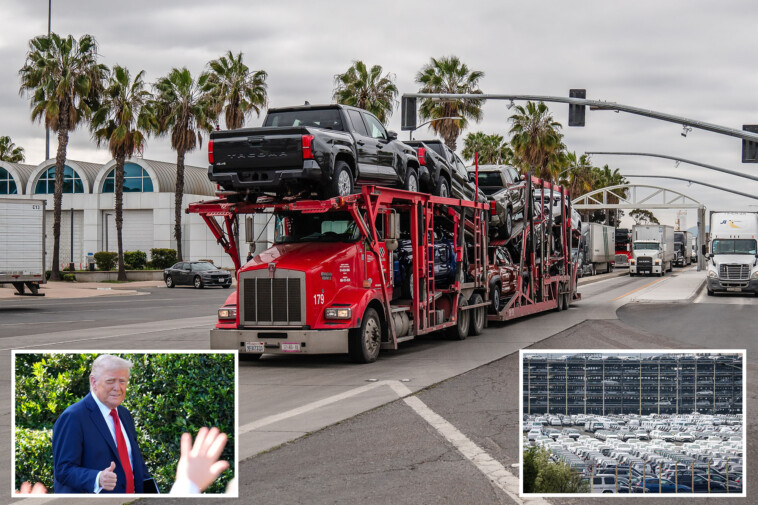President Trump is set to ease the impact of automotive tariffs by partially rolling back levies on imported car parts, sources familiar with the matter told The Post.
The move means automakers facing Trump’s 25% tariff on imported cars — which was implemented earlier this month — will not also have to pay separate tariffs on materials such as steel and aluminum, senior administration officials told reporters on a Tuesday morning call.
The changes, first reported by The Wall Street Journal, will be applied retroactively, allowing manufacturers to potentially receive refunds for tariffs already paid.
Tariffs planned for imported auto parts, originally set at 25% and scheduled to begin on May 3, will also be adjusted.
Automakers will be allowed reimbursement up to 3.75% of the value of each vehicle produced in the US during the first year.
In the second year, reimbursements would decrease to 2.5%, eventually phasing out completely.
Cars that have at least 85% of their components made in America will have no auto tariff imposed on them whatsoever.
These modifications come as Trump prepares for a rally near Detroit to mark 100 days since his return to office.
Administration officials stressed the destacking of tariffs is intended to boost US manufacturing and came out of “constant contact” negotiations with domestic car manufacturers — and allow US companies time to get their supplies from within the US.
However, some inside the White House have been left wondering why the modifications weren’t put in place earlier.
“The entire tariff policy lacks coherence,” said one source close to the administration. “That’s the problem.”
“What are we doing and why are we doing it?” the source said.
A senior administration official said the negotiations came about after car makers convinced the president that giving them some time to adjust would reap benefits in the long run.
“The automakers, both domestic and foreign, made it crystal clear that tens of thousands of jobs, dramatic increase in shift — dramatic, dramatic increase in production, both extension of production lines, built factories coming in — that would be the payoff to America if the president would give them this latitude for the next year and two years,” the official said.
“President Trump is building an important partnership with both the domestic automakers and our great American workers,” Commerce Secretary Howard Lutnick told the Journal.
“This deal will be a major victory for the president’s trade policy by rewarding companies who are already manufacturing domestically, while providing a runway to manufacturers who have expressed their commitment in investing in America and expanding domestic manufacturing.”
Automakers welcomed the decision, acknowledging its potential to significantly alleviate pressures caused by tariffs.
“Ford welcomes and appreciates these decisions by President Trump, which will help mitigate the impact of tariffs on automakers, suppliers and consumers,” Ford CEO Jim Farley said in a statement.
“We will continue to work closely with the administration in support of the president’s vision for a healthy and growing auto industry in America.”
Farley added that his company “sees policies that encourage exports and ensure affordable supply chains to promote more domestic growth as essential.”
General Motors CEO Mary Barra also expressed approval, noting: “We appreciate the productive conversations with the president and his administration and look forward to continuing to work together.”
The mitigating measures aim to give automakers more time to transition supply chains to the United States, which aligns with Trump’s broader objective of boosting domestic manufacturing.
Automakers will be required to apply for the reimbursements, though the mechanism for how the refunds will be dispersed remains unclear, according to the Journal.
Analysts had warned that Trump’s initial 25% tariff could significantly raise vehicle prices.
Morgan Stanley projected an average increase of $6,000 per car, translating to a 10% to 12% price hike for consumers.
Start your day with all you need to know
Morning Report delivers the latest news, videos, photos and more.
Thanks for signing up!
Prior to implementing the tariffs, Trump cautioned automakers against raising vehicle prices.
Automakers are responding in varied ways to the Trump administration’s new 25% tariffs on imported vehicles, with several brands halting imports, raising prices, or shifting production to the US.
While some companies, like Hyundai and Mercedes-Benz, are temporarily absorbing costs or delaying price hikes, others, including Audi, Jaguar Land Rover and Mitsubishi, are pausing deliveries altogether.
The evolving landscape reflects industry-wide uncertainty, with carmakers balancing tariff impacts, consumer pricing, and long-term supply chain strategy.
The administration’s move to soften auto tariffs follows recent efforts by Trump to temper other aspects of his aggressive trade policies, which triggered market volatility and lobbying efforts by businesses and international partners.
Earlier this month, Trump temporarily paused several tariffs introduced shortly before, and scaled back rhetoric and tariffs aimed at China after imposing substantial levies on Chinese imports.
Trump and his economic team have been in negotiations with dozens of countries after the president imposed a 90-day pause on his high Liberation Day tariffs.
The White House has yet to announce any trade deals with countries, but insist they are getting close, and that 18 proposals have been on the table.







